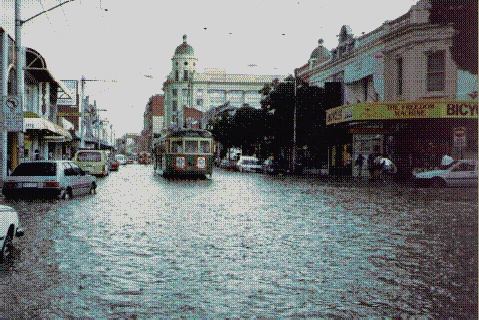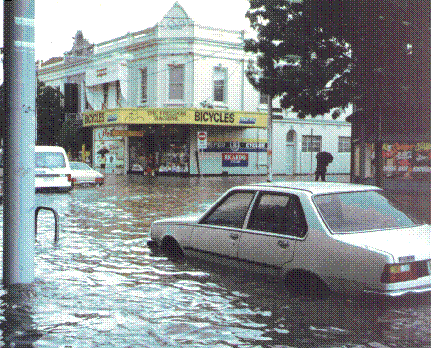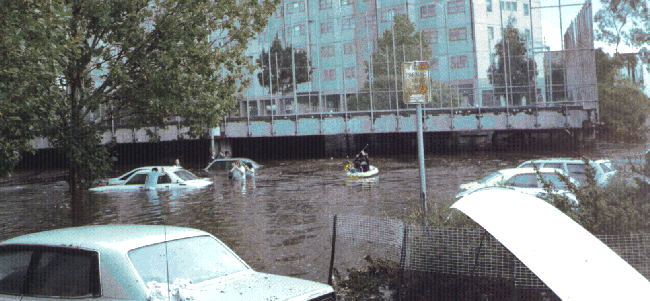THE GREAT ST KILDA FLOOD
The day of 7 February 1989 began as usual for that time of year – which
is to say blisteringly hot. When I drove to work, I did not take my laptop
with me, which was for the first time in a week. I had never been able
to find time to use the thing, so it was just hogging space and effort
on my part. Due to lack of any reason, I did not take a camera either –
none of the pictures here were taken by me.
The summer heat remained constant all day, even during the
rain that fell around lunch-time.
The air-conditioning worked. This fact is something of a marvel.
The thing normally delights in breaking down during heat waves, and the
highness of the temperature is in direct proportion to the likelihood of
a breakdown. No repairmen ever show up at the time this happens, as they
do not like heat. They wait for the first cool day before they show up
– if then.
 About four in the afternoon there came some forked lightning out over
the bay, followed by local rain. Then we had some impressive thunder.
After this, rain descended with a vengeance. (Later on they said that more
rain fell on St Kilda in one hour than it normally gets in one year.) Not
surprisingly, customers began to stay away. This is not unusual during
rain. St Kilda Post Office sits rather on its own, given the
gradual moving-away of surrounding businesses over the last hundred years.
There are a lack of nearby shops with overhangs for people without
umbrellas to arrive dry. Customers stay away during times of rain, and show
up all at once when the moisture slacks off, or close of business approaches,
whichever comes first. This day was to be different.
About four in the afternoon there came some forked lightning out over
the bay, followed by local rain. Then we had some impressive thunder.
After this, rain descended with a vengeance. (Later on they said that more
rain fell on St Kilda in one hour than it normally gets in one year.) Not
surprisingly, customers began to stay away. This is not unusual during
rain. St Kilda Post Office sits rather on its own, given the
gradual moving-away of surrounding businesses over the last hundred years.
There are a lack of nearby shops with overhangs for people without
umbrellas to arrive dry. Customers stay away during times of rain, and show
up all at once when the moisture slacks off, or close of business approaches,
whichever comes first. This day was to be different.
Rain fell faster than it could drain away down the gutters.
Much faster. The roads began to flood.
Hail fell.
Then, against all belief, the rain got worse.
The footpath outside the p.o. vanished underwater. Completely. All
sight of the gutter vanished, and a sheet of water extended out from the
side of the building towards the middle of the road. The post office vehicle
parked outside looked like it was going to float away. The driver was forced
to move fast to get some things indoors, when he realised the floor of
his car was going under.
The sheet of water now extended from the side of the building clean
across the road to the hotel on the other side of Inkerman Street, with
no sign of footpaths or road in between. Looking through a street window
in Venice, there might be a sight like this. Here, if you wanted to stick
your head out in the rain, you could see solid road and footpath further
away ... and getting further away all the time.
I still was not thinking in terms of "Hey, this is a flood." There
are places in Melbourne where flooding of parts of roads occurs in times
of heavy rain, but St Kilda is not one of them.
Anyone wanting to get into the St Kilda Post Office has to climb
steps. This is one reason the place is not popular with wheelchairs. On
this day it was the reason we all had dry feet (at least for the moment
– the water level was continuing to rise) and we found ourselves wondering
about the much-friendlier-to-the-handicapped National Bank down the street,
where one could just stroll in through the door at dead-on ground level.
(The staff were sitting on their counter, thinking about there newly-laid
carpetting which had been quick to vanish from the view of human ken.)
Then the post-office guttering overloaded – catastrophically. Water
had to go somewhere, and was not content with just spilling directly off
the roof onto the street. It sought and found new places to go, thereby
startling those of us below. Be it known that the St Kilda Post Office
is a two-storey building, and on the ground floor we were getting water
forcibly intruding on us. It started coming down the walls in the customer
space, from the ceiling. It came in through the old ventilation ducts.
An awful lot of dust and muck had accumulated over the years, so the water
that spilled out of those ducts was blackish in colour. (It presented a
challenge for the cleaner to remove the stains, in drier times, later.)
Water came through the ceiling cornice. Water came down the electric light
fixtures. The affected lights were switched off to avoid the possibility
of a short.

Outside, the water was beginning to lap at the top step. (Just a
little bit higher, and it would not be outside for very much longer.) Tables
and desks started to get looked at in a new light. From the top step to
the wall of the hotel across the road was now a level sheet of rushing
water. It was like looking at a river, the illusion of which was spoiled
by the occasional passing car. Those passing too near the p.o. side of
the road came to a stop due to water in the engine, thus ceasing to be
passing traffic. The smart vehicles went to and fro on the far side of
the road. I personally saw one driving along the footpath! Trams were stacked
along the hill up St Kilda road, not daring to venture into deeper water
toward Carlisle Street.
Saw somebody wading along the road, who fell over and went under.
Whoever it was got up again in a hurry. I never heard of anyone drowning,
but it would have been possible.
Water really travelled along Inkerman Street. Postmen arriving late
back at the office had trouble wheeling their bikes in, almost up to their
waists in water, fighting a strong current all the way.
There was a "dip" in the power and the computers went out.
A fire engine (a fire in this weather?), siren wailing, had trouble
getting through the moving and motionless traffic at the intersection.
There was an abandoned car sticking out of the water near the front door.
One photograph I was shown a week afterwards was a hair-raising sight.
It simply showed a certain block of flats, with a smooth sheet of water
extending through a fence and right up to the side of the building. The
hair-raising part about this otherwise tranquil-looking scene was the knowledge
that beyond that fence was a sloping drive-way leading to an underground
garage. Cars floated at first, I am told, until they hit the ceiling. Then
they sank, hitting the floor and other cars.
 The rain stopped.
The rain stopped.
Water was still coming from the ceiling. Bags of mail were moved
up off the floor onto tables. The truck which normally came to pick the
mail up at this time of day was not going to get through. The mail was
going to be late.
The water level began to recede, and the footpath across the road
began to become visible.
Then rain fell again.
By now I was ready to go home. My flat is in the bottom of a hollow.
Seeing the way a street could fill up like that, I was worried what I would
find when I got there. (No worry as it turned out. Only St Kilda copped
the part of the downpour with flooding strength. Lower-lying surrounding
areas were hit by the drain-off, but my home eight kilometres distant was
cosy and dry.)
Water out the front, water out the back. A prickly question arose.
How was I going to leave?
During another rain lull – or a reduction of it to where an umbrella
could keep one dry – I noted the shallowest course to my car, rolled up
my trouser legs, took off my shoes and socks, and waded for it. The sensation
of walking barefoot along a submerged road is best described as slimey
and icky.
My car was reasonably dry, being parked on a slope well above the
waterline.
Traffic was almost at a standstill, even on manageable roads. Heard
one driver tell a pedestrian he had been one and a half hours coming from
Port Melbourne.
I got home, eventually. It had been hailing hard when I pulled out
of the street where I had parked. There was blue sky overhead when I reached
my driveway. Melbourne weather.
The rain that day cost the city $8 000 000.
Bruce Barnes
February 1989
Return to: The Bruce
Barnes Home Page
Go to:
People confronted by a blank space between "Go To" and two
non-functioning buttons do not have javascript-savvy browsers, and should
go here.
(This web page <http://geocities.datacellar.net/twin_spires/flood1989.html> is a U.S. echo for one in Australia, at http://home.connexus.net.au/bruce42/flood1989.html)
This page hosted by  Get your own Free Home Page
Get your own Free Home Page
 About four in the afternoon there came some forked lightning out over
the bay, followed by local rain. Then we had some impressive thunder.
After this, rain descended with a vengeance. (Later on they said that more
rain fell on St Kilda in one hour than it normally gets in one year.) Not
surprisingly, customers began to stay away. This is not unusual during
rain. St Kilda Post Office sits rather on its own, given the
gradual moving-away of surrounding businesses over the last hundred years.
There are a lack of nearby shops with overhangs for people without
umbrellas to arrive dry. Customers stay away during times of rain, and show
up all at once when the moisture slacks off, or close of business approaches,
whichever comes first. This day was to be different.
About four in the afternoon there came some forked lightning out over
the bay, followed by local rain. Then we had some impressive thunder.
After this, rain descended with a vengeance. (Later on they said that more
rain fell on St Kilda in one hour than it normally gets in one year.) Not
surprisingly, customers began to stay away. This is not unusual during
rain. St Kilda Post Office sits rather on its own, given the
gradual moving-away of surrounding businesses over the last hundred years.
There are a lack of nearby shops with overhangs for people without
umbrellas to arrive dry. Customers stay away during times of rain, and show
up all at once when the moisture slacks off, or close of business approaches,
whichever comes first. This day was to be different.

